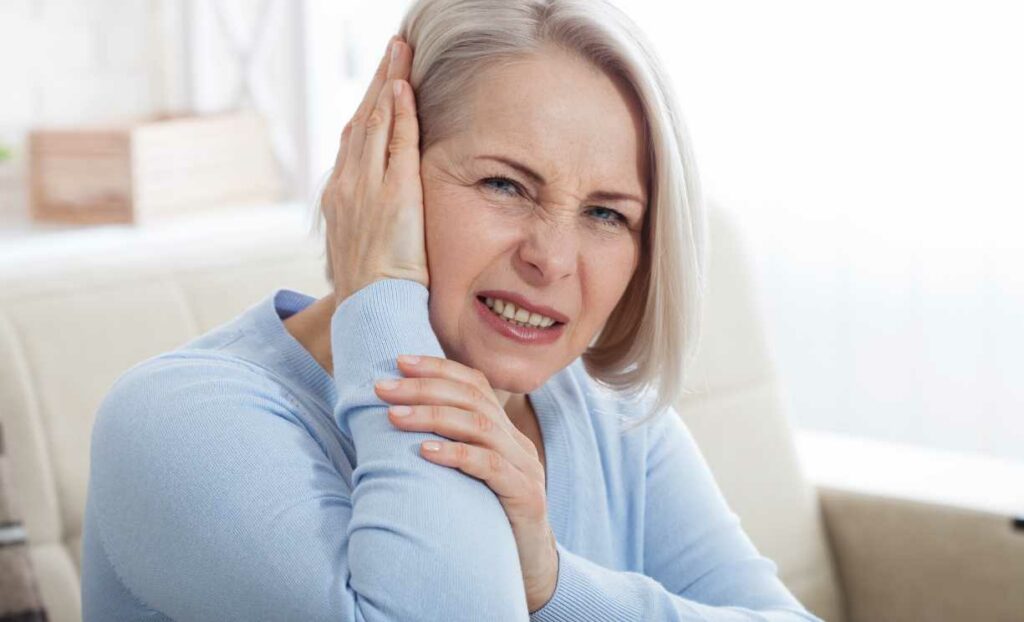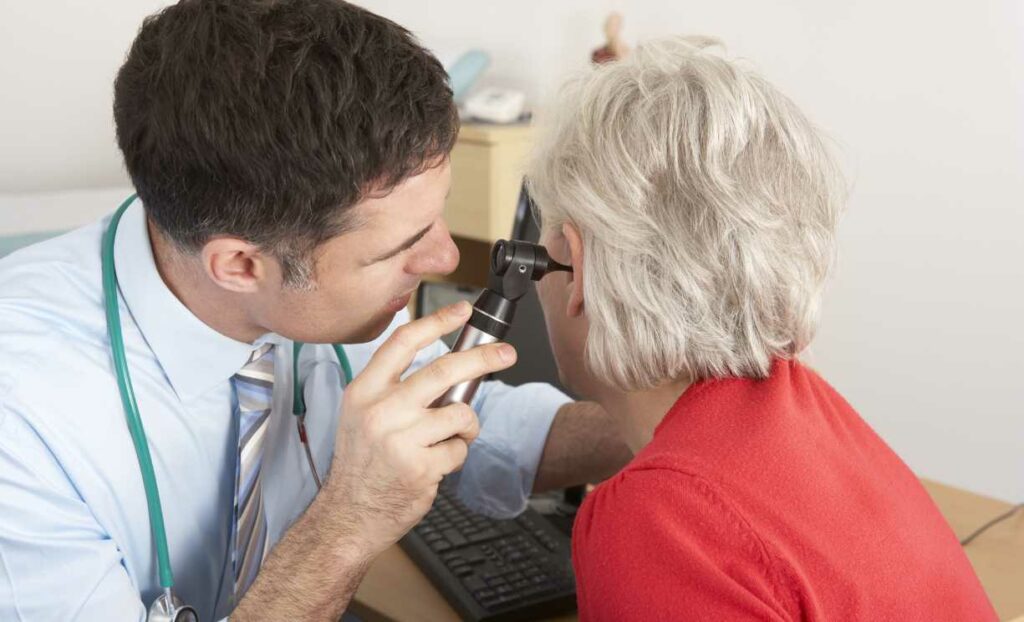Menopause, a transformative phase in a woman’s life, brings with it a myriad of changes, both physical and emotional. One lesser-known companion on this journey is tinnitus, a condition characterized by ringing, buzzing, or hissing sounds in the ears. In this blog, we explore the intricate relationship between tinnitus and menopause and delve into effective treatment strategies for finding harmony amidst the perceived silence.
Contents
What Is Tinnitus?
Tinnitus is the perception of sound when no external sound source is present. It often manifests as ringing, buzzing, hissing, or other similar noises in the ears. Imagine hearing a constant or intermittent sound, such as a high-pitched ring or a gentle hum, without any external stimulus creating that noise. Tinnitus can be a result of various factors, including exposure to loud noises, age-related hearing loss, earwax blockage, or underlying health conditions.
While it’s not a disease itself, tinnitus can be a symptom of an underlying issue. It can vary in intensity and may be temporary or persistent. For some, it’s a minor annoyance, while for others, it can significantly impact daily life. Seeking medical attention is crucial to identifying the cause and exploring potential treatments for managing tinnitus.
Why Does Menopause Cause Tinnitus?
During menopause, hormonal changes play a significant role in various bodily functions, and they can also affect the auditory system, potentially leading to tinnitus. The decline in estrogen levels, a key hormone in women, is associated with age-related changes and the onset of menopause. Estrogen is believed to have a protective effect on the delicate structures of the inner ear. As estrogen levels decrease, the auditory system may become more vulnerable to the effects of aging and other factors, contributing to the perception of sounds like ringing or buzzing, known as tinnitus.
Additionally, hormonal fluctuations can impact blood flow and neurotransmitter activity in the auditory pathways, potentially influencing the occurrence or exacerbation of tinnitus during the menopausal transition. While the exact relationship is complex and not fully understood, hormonal changes are considered a contributing factor to tinnitus during menopause.
Treatment Approaches For Tinnitus During Menopause
When it comes to the treatment of tinnitus during menopause, a range of approaches exists, addressing both the hormonal changes and the symptoms themselves. Here are several treatment strategies:
- Hormone Replacement Therapy (HRT): Hormone Replacement Therapy involves the use of hormones such as estrogen and progesterone to address the hormonal imbalances associated with menopause. By restoring hormonal levels, HRT aims to positively impact the auditory system, potentially reducing the occurrence or severity of tinnitus.
- Sound Therapy: Sound therapy leverages external sounds to create a more soothing auditory environment. White noise machines, nature sounds, or calming music can help mask or distract from the persistent ringing or buzzing associated with tinnitus. This approach aims to make the perceived sounds less noticeable.
- Cognitive Behavioral Therapy (CBT): CBT is a psychological approach that focuses on changing negative thought patterns and behaviors associated with tinnitus. By addressing emotional reactions and promoting coping strategies, CBT helps individuals manage the psychological impact of tinnitus, reducing stress and improving overall well-being.
- Tinnitus Retraining Therapy (TRT): TRT is a comprehensive approach that combines counseling and sound therapy. The goal is to help individuals habituate to the sounds of tinnitus, shifting their perception to make the sounds less intrusive over time. This therapy addresses both the auditory and emotional components of tinnitus.
- Acupuncture: Acupuncture, a traditional Chinese medicine practice, involves the insertion of thin needles into specific points of the body to promote balance and well-being. While the mechanism is not fully understood, some individuals find relief from tinnitus symptoms through acupuncture.
- Medical Evaluation: Seeking a thorough medical evaluation is crucial to identify any underlying conditions contributing to tinnitus. This may involve consultations with audiologists, ENT specialists, or gynecologists. Understanding the specific factors contributing to tinnitus helps healthcare professionals tailor treatment recommendations for each individual.
Does Menopause Tinnitus Go Away?
In many cases, menopause-related tinnitus does not go away entirely. Tinnitus during menopause is often associated with hormonal changes and age-related factors that can impact the auditory system. While the intensity of the ringing or buzzing sounds may fluctuate, complete resolution is not guaranteed for everyone.
However, there are various treatment approaches that can help manage and alleviate the symptoms. Seeking guidance from healthcare professionals is essential to determine the most suitable treatment plan. While it may not disappear entirely, effective management strategies can significantly reduce the impact of tinnitus on daily life.
How To Manage Menopause-Related Tinnitus?
Managing menopause-related tinnitus on your own involves adopting lifestyle changes and self-care practices that can help alleviate symptoms. Here are some strategies you can implement:
- Sound Therapy: Incorporate soothing background noises, such as nature sounds or white noise, to mask the tinnitus and make it less noticeable.
- Stress Reduction: Practice stress-reducing techniques like deep breathing, meditation, or yoga to alleviate tension, as stress can exacerbate tinnitus symptoms.
- Hearing Protection: Protect your ears from loud noises that can exacerbate tinnitus. Use earplugs or earmuffs in noisy environments.
- Stay Hydrated: Maintain proper hydration, as dehydration can sometimes contribute to tinnitus.
- Educate Yourself: Learn more about tinnitus and its relationship to menopause. Understanding the condition can empower you to better manage its impact.
How Long Does It Take For Tinnitus To Resolve?
The duration for tinnitus to resolve varies widely among individuals, and in some cases, it may not completely go away. Tinnitus can be temporary or chronic, and factors such as the underlying cause, individual health, and treatment effectiveness play significant roles.
Temporary tinnitus, often caused by loud noise exposure, changes in ear pressure, or certain medications, may resolve on its own relatively quickly—within a few days to a few weeks—once the triggering factor is removed or addressed.
Chronic tinnitus, which persists for an extended period, may be due to conditions like age-related hearing loss, inner ear damage, or neurological issues. In these cases, complete resolution is less common. However, various management strategies can help reduce the severity and impact of tinnitus over time.
Conclusion
In conclusion, menopause brings with it unexpected notes, one of which is the often persistent tune of tinnitus. While menopause-related tinnitus may not always completely fade away, the treatment is possible and it can be effectively managed through a harmonious blend of approaches. From hormone replacement therapy addressing the underlying hormonal shifts to sound therapy providing a comforting backdrop, and lifestyle modifications contributing to overall well-being, there is a melody of strategies to navigate this auditory challenge.
While the tinnitus may linger, the ability to effectively manage its impact on daily life is within reach. The pursuit of relief is ongoing, and the commitment to a tailored treatment plan, coupled with regular communication with healthcare providers, ensures that individuals can embrace the melody of menopause with resilience and a sense of empowerment.




